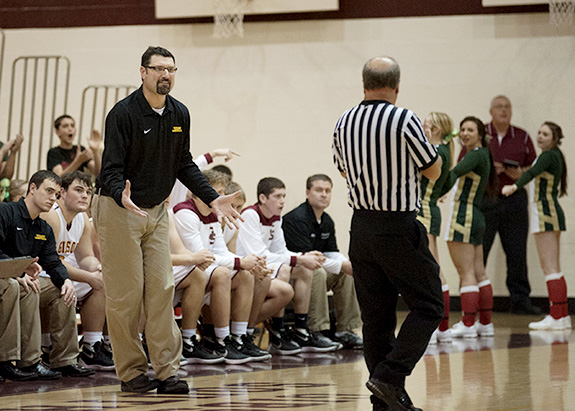Lead ‘em Up teaches leadership, character to athletes
Sports programs today are designed to create the complete athlete, from strength training to skill development and nutrition. But very few focus on character.
 That’s a void Adam Bradley wants to fill. Last August he began by launching Lead ‘em Up, a training program that helps athletes realize their potential as leaders on and off the playing surfaces. In the first four months, 87 teams in five countries jumped on board, and Bradley believes this is just the beginning.
That’s a void Adam Bradley wants to fill. Last August he began by launching Lead ‘em Up, a training program that helps athletes realize their potential as leaders on and off the playing surfaces. In the first four months, 87 teams in five countries jumped on board, and Bradley believes this is just the beginning.
Engagement was critical, and Bradley recognizes that Lead ‘em Up could have been doomed from the start if it didn’t embrace a concept that captivated young student-athletes. His first talk came three years ago with a group of football players, a session that focused on what it takes to be successful. It was supposed to be a one-time affair, but Bradley received a call from the coach later that night asking if he could come back. The meetings then became weekly.
Lead ‘em Up was years from launching, but it was those weekly sessions that began to lay the foundation for Bradley’s character development curriculum. He found himself structuring his talks around internal struggles or challenges within the team, relating directly to the world in which the players were living. He documented everything, and began attending games and practices.
“As I went through the season and getting feedback from coaches and players, it began to reveal itself,” Bradley said. “If this school needs this type of ongoing leadership influence, there’s a good chance that the school down the street needs it too.”

In February, Bradley made a trip to Illinois, where he worked with the varsity boys basketball team at Crystal Lake Central High School. The lesson was “selflessness,” and Bradley’s goal was to shift the mentality of players, getting them to think more about their teammates instead of themselves.
To do this, Lead ‘em Up’s curriculum includes several “games” that create interaction among players. One activity asks a player to choose a card, each including its own unique word like “loved” or “enthusiastic.” That player who selected the card must have a conversation with one of their teammates, making him or her feel that emotion.
The games could come off as corny to a group of rowdy teenagers, but they’re proven to work. Minutes into the exercise, the Crystal Lake Central players are engaged, laughing and learning how their words affect the emotions and attitudes of their teammates. That’s exactly what Bradley is looking for.
Chris Lun just finished his 12th season as the head boys basketball coach at Whitman High School (Maryland). He never identified a need for character training in his program, but after talking with Bradley last year, he decided to give it a try.
“Adam made a good point, you want the kids to act certain ways but you never take the time to talk about it and coach them like you would with drills,” Lun said. His team made a run deep into the playoffs last season, and he believes the character training contributed to its success.
“You want them to get better with communication and their body language,” he continued, “but you have to practice those. That’s why we decided to give it a shot.”
Lun, like other coaches who have used Lead ‘em Up, plans to make it a staple in his program. It signals a turning of the tide for many team leaders who never imagined character development would become a regular part of their training.
Bradley reflects upon his days as a young athlete, and he can’t recall any type of consistent leadership training. His coach would occasionally talk about character and every now and then a guest speaker would visit to talk about overcoming adversity, but that was the extent of it.
“Programs have evolved a lot over the last 10 or 15 years,” Bradley said. “But what coaches are starting to recognize is a lot of times it’s not talent that’s holding them back. It’s the other intangibles, and these young people have to understand how to hold people accountable.
“More and more coaches recognize that it’s important to create the right culture, and I think our society helps fuel it a bit. You see so many pro athletes where the talent is there, but they do something to get suspended. It’s so prevalent now.”
Bradley is confident that once schools see his approach and its effects, they’ll buy into the need for character development. The training activities used by Lead ‘em Up are backed by research, and Bradley said professional teams like the New York Yankees, Pittsburgh Pirates and Dallas Mavericks have used the games with their athletes.
Some of the activities in Lead em’ Up’s curriculum were created by Bradley, and some are licensed from Florida-based Game On, an organization that specializes in team building and leadership training. Although Bradley has done some of the training himself, Lead ‘em Up’s curriculum is online and gives schools the power the administer the activities themselves. That helps coaches develop the skills to teach character and leadership.
“You always hear that you don’t know something fully until you have to teach it,” Bradley said. “Throughout the season, coaches become so entrenched in this mindset of leadership and character that they find themselves looking out at practice to find examples they can use in next week’s session. It was almost a byproduct of the program.”
Bradley believes the future for Lead ‘em Up is promising. As more coaches hear the success stories from their colleagues, he expects the demand for character training to increase. He’s already preparing to roll out the second edition of Lead ‘em Up’s programming, and he eventually wants to create four years worth of curriculum that focuses on 48 different categories of character development — overcoming adversity, honoring others, body language, habits.
If the last few years has taught Bradley anything, it’s the value of creating the “complete athlete.” Now it’s just a matter of getting coaches to buy in.
“Even though we’re being successful, I still feel like the number of people on the fence still outweigh the people who desperately want it,” Bradley said. “And what I noticed is that the people who are on the fence are usually the ones who need it the most.”





